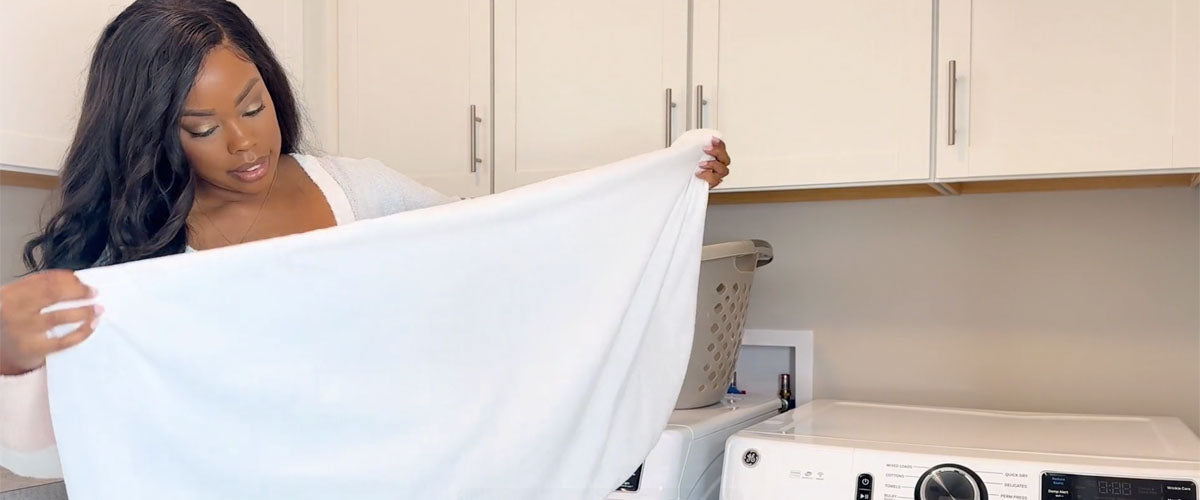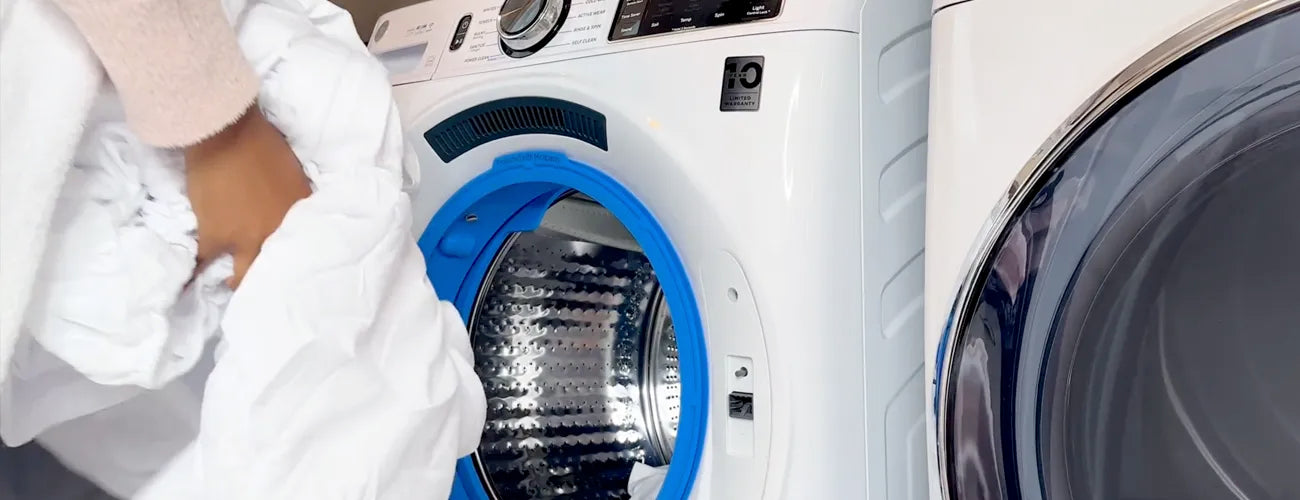The Ultimate Laundry Guide to Keep Towels Soft, Fluffy and Absorbent
Towels are an essential part of our daily laundry routines, from freshening up after a shower to wiping our hands throughout the day. But over time, they can lose their soft, plush feel and absorbency, especially after several cycles in the washing machine, leaving them rough and less effective. Thankfully, with the right care during laundry, you can keep your towels feeling like new. In this guide, we’ll cover the best practices for keeping towels soft and absorbent while embracing eco-friendly, non-toxic solutions like Sheet Yeah! detergent sheets.

Why Towels Lose Softness and Absorbency Over Time
Common Mistakes in Towel Care
It’s easy to make simple mistakes when caring for towels, and these can lead to towels becoming stiff or less absorbent. Some of the most common towel-care blunders include:
- Overusing detergent: excess detergent builds up in towel fibres, making them stiff.
- Using fabric softener: While it might seem like a good idea, fabric softener builds up on your towels and creates a waxy layer that repels water, reducing absorbency and making your towels less effective.
- Over-drying: High heat in dryers can break down fibres over time, making towels less fluffy.
The Role of Detergents and Fabrics
Towels, especially those made from natural fibres like cotton, need gentle care. Harsh chemicals in many traditional detergents can degrade fibres, causing them to lose their softness. Opting for non-toxic, natural products like Sheet Yeah! detergent sheets can help maintain the integrity of their fibres, ensuring long-lasting softness and absorbency.

Proven Methods to Keep Your Towels Soft
Choose the Right Detergent
Use a detergent free from harsh chemicals to have gentle, soft, and fluffy towels on your skin. Sheet Yeah! detergent sheets, for example, are free from toxins and are gentle on fabrics, making them ideal for keeping the performance of your towels. These detergent sheets also reduce detergent residue, keeping them fresh and soft.
Avoid Fabric Softeners
Fabric softeners might sound like a good solution to keep your towels fluffy, but they actually do more harm than good. Towel softer coats the fibers with a waxy substance that reduces absorbency over time. Instead, use natural alternatives like white vinegar to break down detergent buildup and keep towels soft without chemicals.
The Power of Vinegar and Baking Soda
For a deep clean that keeps towels feeling fresh, try adding half a cup of white vinegar to the rinse cycle. The vinegar helps break down detergent residue and restore the natural softness. Baking soda is another excellent natural solution—it softens towels while eliminating odours, making your towels come out fresh and fluffy.
Optimal Water Temperature
To protect towel fibers, it’s important to wash them at the right temperature. Cotton towels in warm water wash (30–40°C or 86–104°F) are ideal, as it effectively removes dirt, keeping the fibers of the towel like new. For microfiber towels, stick to a cold wash to preserve the integrity of the synthetic fibers.

Best Drying Practices to Maintain your Towels Fluffy
Air Dry or Tumble Dry – Which is Better?
Both air drying and tumble drying have their advantages. Air drying is the most eco-friendly option and reduces wear and tear on towels. However, air-dried towels can feel a bit stiff. To counter this, shake the towels to fluff up the fibers before hanging them to dry. If you prefer a dryer, use a low heat setting during the drying cycle to prevent fiber damage and respect the drying time.
The Wool Dryer Ball Trick for making your towels soft and fluffy.
To help separate the towels in the dryer, add a couple of wool dryer balls to the drum. It allows air to circulate more effectively. This trick helps keep them soft, fluffy, and more absorbent.
Don’t Over-Dry
It’s tempting to let towels sit in the dryer longer to ensure they’re completely dry, but we suggest you don't over-dry towels because it will damage the fibers and reduce softness. Remove towels while they’re still slightly damp to the touch and finish air drying them to maintain their softness.

Pro Tips for Prolonging Towel Absorbency
Always Wash Towels Separately
Washing towels with clothes or other laundry can cause excess lint and fabric friction, leading to less absorbency over time. Keep towels in a separate laundry load to ensure they remain as absorbent as possible and to make your towels last longer.
Don’t Use Too Much Detergent
Using too much detergent might seem like a way to ensure clean towels, but it often results in detergent residue building up in the fibers. Stick to the recommended amount of detergent (or even use less) to keep towels fresh and absorbent.
Skip the Bleach
While bleach is a go-to for many people with white towels, it can break down the fibers, leading to a loss of softness. Instead of bleach, use an oxygen-based whitener or natural alternatives like lemon juice to keep towels bright without damaging them.
Eco-Friendly Laundry Tips to Keep Towels Fresh
Embrace Low-Tox Laundry Solutions
At Sheet Yeah!, we believe that laundry should be safe for your skin and the planet while also ensuring your towels come out soft and fluffy. Our detergent sheets are designed to clean your towels without the need for harmful chemicals. They’re gentle on fabrics and safe for sensitive skin, making them a perfect option for those with allergies or skin conditions. We receive so many comments from people with Eczema who love our laundry sheets.
Sustainable Drying Practices
For those looking to lower their environmental impact, consider hanging your towels on the line drying. Not only does this save energy, but the sunlight also naturally deodorises and sanitises your towels. If you’re using a dryer, opt for an energy-efficient model and use the low heat setting to reduce your carbon footprint. We recommend not leaving wet towels in your basket or washing to avoid the accumulation of germs and bacteria that can lead to bad odour and build-up on your towels.
Conclusion: Keep Your Towels Soft and Absorbent with Eco-Friendly Care
With the right approach, you can keep your towels soft, absorbent, and long-lasting. By avoiding fabric softeners, using eco-friendly products like Sheet Yeah! detergent sheets, and following the best washing and drying practices, you can ensure your towels stay as fresh as they were on day one. Small, thoughtful changes in your laundry routine can make a big difference in the longevity and quality of your towels.
Frequently Asked Questions (FAQs) About Towel Care
Q: How often should I wash my towels?
Towels need to be washed after 3–4 uses to prevent bacteria buildup. Hand towels should be washed every 2–3 days.
_________________________________________________________________________
Q: How do I revive stiff towels?
If your towels have become stiff, try washing them with half a cup of white vinegar in the rinse cycle, followed by air drying.
____________________________________________________________________
Q: Do different towel types need different care?
Yes, different materials require specific care. For example, cotton towels do well with warm water washes to keep them fluffy and absorbent, while microfiber towels should be washed in cold water to maintain their absorbency.
_________________________________________________________________________
Q: How often should I replace my towels?
A: Towels can last anywhere from 2 to 5 years with proper care. However, if your towels have lost absorbency or have a lingering odor even after washing, it may be time to replace them. Signs of wear, such as fraying or thinning, indicate it is time to unboxing new towels.
Q: Can I wash my towels with other laundry?
A: It’s best to wash towels separately from other laundry items to avoid lint transfer and fabric friction, which can affect the softness and absorbency of your towels. If you need to wash towels with other items, try to group them with similar fabrics, such as cotton sheets.
Q: How can I prevent my towels from getting a musty smell?
A: Ensure your towels are completely dry before folding and storing them to avoid musty odors. You can also add white vinegar to your wash cycle every few weeks to remove detergent residue and prevent odour buildup. Hanging towels in a well-ventilated area after use also helps prevent mold and mildew.
Q: Can I use bleach on my towels?
A: Bleach can weaken towel fibers and reduce softness over time. Instead of bleach, use natural alternatives like baking soda or oxygen-based brighteners in warm water to keep your towels clean and fresh. These methods are gentler on the fabric and will help maintain your towels' absorbency.
Q: Is it okay to iron bath towels?
A: Ironing towels isn’t recommended as the heat can flatten the fibers, making them less soft and fluffy. If you need to remove wrinkles, try to shake towels before folding or use a low heat setting on your dryer with wool dryer balls to fluff them up.
Q: How do I keep my towels fluffy after washing them?
A: To keep towels fluffy, avoid putting too many towels in your washer, use a gentle detergent like Sheet Yeah! detergent sheets, and skip fabric softeners. Additionally, dry your towels with wool dryer balls to help separate the fibers and enhance air circulation during the drying process.
Q: What’s the best water temperature for washing towels?
A: For most towels, a warm wash (30–40°C or 86–104°F) is ideal as it effectively removes dirt without damaging the fibers. For synthetic or microfiber towels, opt for a cold wash to prevent the fibers from breaking down and losing absorbency.
Q: Can I use vinegar and baking soda together to wash towels?
A: Yes, but it’s best to use them in separate cycles. If you use baking soda when you wash your towels, you will keep them soft and remove odours, then add vinegar during the rinse cycle to eliminate detergent buildup and restore softness. Using them together at the same time can neutralise their effects.





